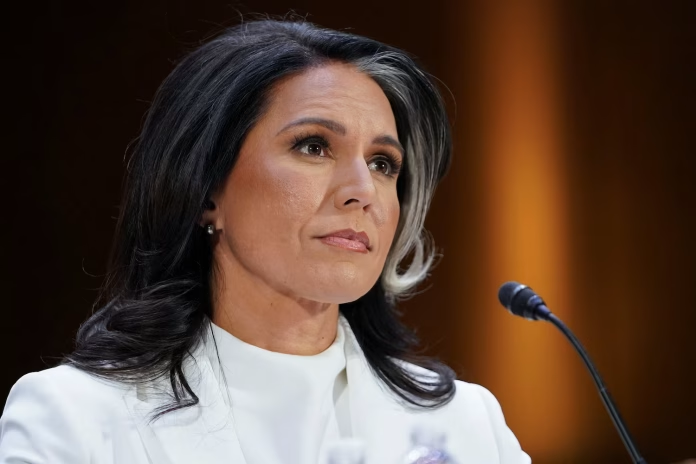The U.S. Senate has officially confirmed Tulsi Gabbard as the Director of National Intelligence (DNI) under President Donald Trump’s administration. The confirmation, which came after a narrow 52-48 vote, marks a significant shift in the leadership of the intelligence community. Gabbard, a former U.S. Representative from Hawaii and a military veteran, is set to oversee 18 intelligence agencies, ensuring national security and intelligence coordination.
In This Article:
Tulsi Gabbard’s Background and Experience
Political Career
Tulsi Gabbard served as the U.S. Representative for Hawaii’s 2nd congressional district from 2013 to 2021. She was known for her independent stance on various issues and her advocacy for non-interventionist foreign policies.
Military Service
Gabbard is a lieutenant colonel in the U.S. Army Reserve, with experience in Iraq and Kuwait. Her military background has been a central point in her nomination, as she emphasized her commitment to national security and intelligence integrity.
Intelligence Experience
Despite her political and military credentials, Gabbard has limited direct experience in intelligence operations. Critics have pointed out her past comments on foreign affairs, particularly regarding Russia and Syria, as potential concerns for her new role.
The Nomination and Confirmation Process
Trump’s Choice for DNI
President Donald Trump nominated Gabbard on November 13, 2024, citing her leadership skills and military expertise. Her nomination sparked debates among lawmakers, with some questioning her lack of intelligence experience.
Senate Confirmation Hearing
During her confirmation hearing on January 30, 2025, Gabbard addressed concerns about her qualifications. She pledged to strengthen intelligence agencies, combat unauthorized leaks, and ensure a depoliticized approach to intelligence gathering.
Final Senate Vote
The Senate confirmed Gabbard’s nomination with a 52-48 vote. While most Republicans supported her, some, including Senate Minority Leader Mitch McConnell, opposed the nomination. Democrats largely voted against her, citing her past foreign policy positions and limited intelligence background.
Key Responsibilities as Director of National Intelligence
Overseeing U.S. Intelligence Agencies
As the DNI, Gabbard will be responsible for coordinating intelligence efforts across 18 agencies, including the CIA, NSA, and FBI. Her role will involve ensuring seamless communication and collaboration between these entities.
Advising the President
Gabbard will serve as the principal intelligence advisor to President Trump, providing critical national security insights and assessments. Her influence will shape U.S. foreign and domestic security policies.
Addressing Intelligence Leaks
One of Gabbard’s primary goals is to eliminate unauthorized intelligence leaks. She has vowed to enforce stricter protocols to protect classified information and ensure national security.
Controversies and Opposition
Foreign Policy Stances
Gabbard has faced scrutiny over her past comments regarding Russia, Syria, and Edward Snowden. Critics argue that her previous positions could impact her approach to intelligence management and national security.
Limited Intelligence Experience
Many lawmakers expressed concerns about Gabbard’s lack of direct intelligence experience. However, supporters argue that her military background and leadership skills will enable her to navigate the complexities of the intelligence community effectively.
Bipartisan Reactions
While Trump and his allies praised Gabbard’s nomination, opposition from both sides of the aisle remains strong. Some intelligence officials have expressed skepticism, urging caution as she takes on this critical role.
Future Implications of Gabbard’s Appointment
Strengthening National Security
If successful in her role, Gabbard could bring fresh perspectives to the intelligence community, enhancing national security strategies and inter-agency collaboration.
Political Impact
Gabbard’s appointment could influence future political landscapes, particularly within the Republican Party. Her alignment with Trump may signal a broader realignment of intelligence and security priorities.
Challenges Ahead
Gabbard will face significant challenges, including managing geopolitical threats, addressing cyber warfare, and restoring public trust in intelligence agencies. Her ability to navigate these complexities will determine her success in the role.
Tulsi Gabbard’s confirmation as Director of National Intelligence marks a pivotal moment in U.S. intelligence leadership. While her appointment comes with controversies and challenges, her military background and commitment to reform could reshape intelligence operations. As she takes on this critical position, the nation will closely watch how she balances security priorities and political dynamics.
By – Jyothi
ALSO READ – Trump-Modi Meeting: Strengthening US-India Ties in Trade, Defense, and Immigration




